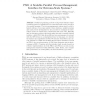Free Online Productivity Tools
i2Speak
i2Symbol
i2OCR
iTex2Img
iWeb2Print
iWeb2Shot
i2Type
iPdf2Split
iPdf2Merge
i2Bopomofo
i2Arabic
i2Style
i2Image
i2PDF
iLatex2Rtf
Sci2ools
129
Voted
PVM
2010
Springer
2010
Springer
PMI: A Scalable Parallel Process-Management Interface for Extreme-Scale Systems
Parallel programming models on large-scale systems require a scalable system for managing the processes that make up the execution of a parallel program. The process-management system must be able to launch millions of processes quickly when starting a parallel program and must provide mechanisms for the processes to exchange the information needed to enable them communicate with each other. MPICH2 and its derivatives achieve this functionality through a carefully defined interface, called PMI, that allows different process managers to interact with the MPI library in a standardized way. In this paper, we describe the features and capabilities of PMI. We describe both PMI-1, the current generation of PMI used in MPICH2 and all its derivatives, as well as PMI-2, the second-generation of PMI that eliminates various short
Distributed And Parallel Computing | Different Process Managers | Parallel Program | Parallel Programming Models | PVM 2010 |
| Added | 30 Jan 2011 |
| Updated | 30 Jan 2011 |
| Type | Journal |
| Year | 2010 |
| Where | PVM |
| Authors | Pavan Balaji, Darius Buntinas, David Goodell, William Gropp, Jayesh Krishna, Ewing L. Lusk, Rajeev Thakur |
Comments (0)

